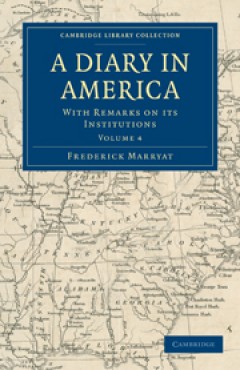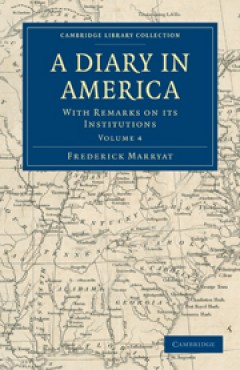Filter by

A Diary in America With Remarks on its Institutions
Captain Frederick Marryat (1792–1848) was a distinguished naval officer, today best remembered as a novelist (particularly of stories for children), often drawing on his own experiences. He also edited a radical journal, and wrote non-fiction, including an attack on press-gangs, which damaged his career. He spent 1837 and 1838 travelling in North America, publishing his impressions in this un…
- Edition
- -
- ISBN/ISSN
- 9781139058711
- Collation
- -
- Series Title
- Cambridge Library Collection - North American History
- Call Number
- -

A Diary in America With Remarks on its Institutions
Captain Frederick Marryat (1792–1848) was a distinguished naval officer, today best remembered as a novelist (particularly of stories for children), often drawing on his own experiences. He also edited a radical journal, and wrote non-fiction, including an attack on press-gangs, which damaged his career. He spent 1837 and 1838 travelling in North America, publishing his impressions in this un…
- Edition
- -
- ISBN/ISSN
- 9781139058728
- Collation
- -
- Series Title
- Cambridge Library Collection - North American History
- Call Number
- -

A Descriptive Catalogue of the McClean Collection of Manuscripts in the Fitzw…
M. R. James (1862–1936) is probably best remembered as a writer of chilling ghost stories, but he was an outstanding scholar of medieval literature and palaeography, who served both as Provost of King's College, Cambridge, and as Director of the Fitzwilliam Museum, and many of his stories reflect his academic background. His descriptive catalogues of manuscripts owned by colleges, cathedrals …
- Edition
- -
- ISBN/ISSN
- 9780511693595
- Collation
- -
- Series Title
- Cambridge Library Collection - History of Printing, Publishing and Libraries
- Call Number
- -

A Descriptive Catalogue of the Manuscripts in the Library of St John's Colleg…
M. R. James (1862–1936) is probably best remembered as a writer of chilling ghost stories, but he was an outstanding scholar of medieval literature and palaeography, who served both as Provost of King's College, Cambridge, and as Director of the Fitzwilliam Museum, and many of his stories reflect his academic background. His detailed descriptive catalogues of manuscripts owned by colleges, ca…
- Edition
- -
- ISBN/ISSN
- 9780511693601
- Collation
- -
- Series Title
- Cambridge Library Collection - History of Printing, Publishing and Libraries
- Call Number
- -

A Descriptive Catalogue of the Manuscripts in the Library of Lambeth Palace
M. R. James (1862–1936) is probably best remembered as a writer of chilling ghost stories, but he was an outstanding scholar of medieval literature and palaeography, who served as Provost of King's College, Cambridge, and Director of the Fitzwilliam Museum, and later became Provost of Eton College. His detailed descriptive catalogues of manuscripts owned by colleges, cathedrals and museums ar…
- Edition
- -
- ISBN/ISSN
- 9780511919947
- Collation
- -
- Series Title
- Cambridge Library Collection - History of Printing, Publishing and Libraries
- Call Number
- -

A Descriptive Catalogue of the Manuscripts in the Library of Lambeth Palace
M. R. James (1862–1936) is probably best remembered as a writer of chilling ghost stories, but he was an outstanding scholar of medieval literature and palaeography, who served as Provost of King's College, Cambridge, and Director of the Fitzwilliam Museum, and later became Provost of Eton College. His detailed descriptive catalogues of manuscripts owned by colleges, cathedrals and museums ar…
- Edition
- -
- ISBN/ISSN
- 9780511919954
- Collation
- -
- Series Title
- Cambridge Library Collection - History of Printing, Publishing and Libraries
- Call Number
- -

A Descriptive Catalogue of the Manuscripts in the Library of Jesus College
M. R. James (1862–1936) is probably best remembered as a writer of chilling ghost stories, but he was an outstanding scholar of medieval literature and palaeography, who served both as Provost of King's College, Cambridge, and as Director of the Fitzwilliam Museum, and many of his stories reflect his academic background. His detailed descriptive catalogues of manuscripts owned by colleges, ca…
- Edition
- -
- ISBN/ISSN
- 9780511702952
- Collation
- -
- Series Title
- Cambridge Library Collection - History of Printing, Publishing and Libraries
- Call Number
- -

A Descriptive Catalogue of the Manuscripts in the Library of Gonville and Cai…
M. R. James (1862–1936) is probably best remembered as a writer of chilling ghost stories, but he was an outstanding scholar of medieval literature and palaeography, who served both as Provost of King's College, Cambridge, and as Director of the Fitzwilliam Museum, and many of his stories reflect his academic background. His detailed descriptive catalogues of manuscripts owned by colleges, ca…
- Edition
- -
- ISBN/ISSN
- 9780511702150
- Collation
- -
- Series Title
- Cambridge Library Collection - History of Printing, Publishing and Libraries
- Call Number
- -

A Chemical and Medical Report of the Properties of the Mineral Waters: Of Bux…
In medical terms, 'mineral water' was, in the early nineteenth century, any water that appeared to have an effect on human health. British physicians often prescribed mineral waters from particular locations - most commonly those at Bath - for a variety of illnesses. However, there was little available information on the chemical composition of these waters, and extant manuals were often inaccu…
- Edition
- -
- ISBN/ISSN
- 9781139839273
- Collation
- -
- Series Title
- -
- Call Number
- -

A Descriptive Catalogue of the Manuscripts in the Library of Eton College
M. R. James (1862–1936) is probably best remembered as a writer of chilling ghost stories, but he was an outstanding scholar of medieval literature and palaeography, who served both as Provost of King's College, Cambridge, and as Director of the Fitzwilliam Museum, and many of his stories reflect his academic background. His detailed descriptive catalogues of manuscripts owned by colleges, ca…
- Edition
- -
- ISBN/ISSN
- 9780511919916
- Collation
- -
- Series Title
- Cambridge Library Collection - History of Printing, Publishing and Libraries
- Call Number
- -
 Computer Science, Information & General Works
Computer Science, Information & General Works  Philosophy & Psychology
Philosophy & Psychology  Religion
Religion  Social Sciences
Social Sciences  Language
Language  Pure Science
Pure Science  Applied Sciences
Applied Sciences  Art & Recreation
Art & Recreation  Literature
Literature  History & Geography
History & Geography